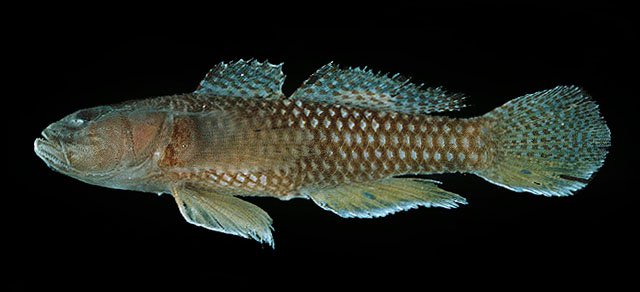| Gobiidae (Gobies), subfamily: Gobiinae |
| 4.7 cm NG (male/unsexed) |
|
demersal; marine; depth range 0 - 40 m, non-migratory |
| Pacific Ocean: Kermadec, Lord Howe, Pitcairn, Easter Island and French Polynesia (Rapa). |
|
Dorsal spines (total): 7-7; Dorsal soft rays (total): 11-11; Vertebrae: 26-26. This species is distinguished by the following characters: interorbital trench absent, merely a slight depression between and behind eyes; incomplete squamation on predorsal, a naked triangular area behind eyes and interorbital area, and a naked bar extending forward from origin of first dorsal fin; in specimens below 20 mm SL midline usually naked, anterior extent of predorsal scales on sides of nape increasing with increasing size; no opercular scales; no scales on cheek; D2 modally I,11; A modally I,9; pectoral rays usually 19-20; reduced transverse pattern of sensory papillae on cheek; pelvic fins connected to form a plate, no interspinal membrane, fifth ray branched; each scale pocket with concentrated melanophores along margin forming a diamond-shaped mark; preserved specimens with vertical bands on head, often none on body; in life, 1-2 very faint vertical bars under first dorsal fin; mouth oblique, forming an angle of 35°-45° with body axis (Ref. 85603). |
| Occurs in rocky and coral reefs from the intertidal to depths of over 20 m (Ref. 85603). |
|
Not Evaluated (N.E.) Ref. (130435)
|
| harmless |
Source and more info: www.fishbase.org. For personal, classroom, and other internal use only. Not for publication.
